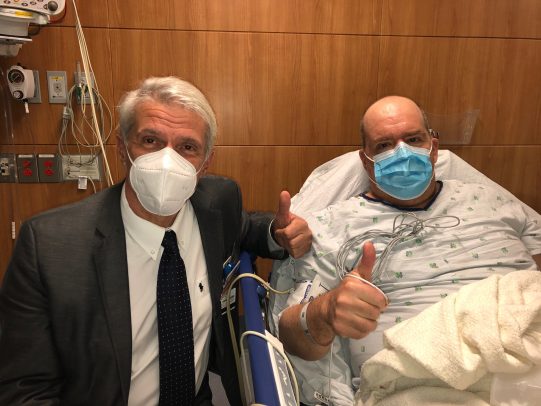UI Health a regional transplant leader in 2020

UI Health performed more kidney, kidney/pancreas and pancreas transplants in 2020 than any other major medical center in the Chicago metropolitan area. The hospital’s combined kidney/pancreas and pancreas transplant programs are the third-largest programs of their kind in the United States.
The transplant team at UI Health — which is the academic health enterprise of the University of Illinois Chicago — performed 199 kidney transplants, 12 combined liver/kidney transplants, 28 combined kidney/pancreas transplants, four pancreas transplants and one small bowel transplant in 2020. The team also performed 66 liver transplants — the highest volume of liver transplants by UI Health in a single year.
Due to the COVID-19 pandemic, the number of kidney transplants was slightly lower than last year, with cadaveric kidney transplants down about 10% and living donor kidney transplants down 46%.
“We had to temporarily close down our living donor kidney program for about a month due to COVID-19 concerns, which did impact our volume, but we never stopped our cadaveric donor program since transplants are considered urgent or emergent operations,” said Jamie Ghafari, senior director, hospital transplant services.
Survival rates for UI Health transplant patients are in-line with national benchmarks, said Ghafari, even though patients in the program are about 80% Black or Latino — populations that tend to be sicker when they receive a transplant — and many patients are overweight or obese. Patients with higher body mass indices, or BMIs, are often rejected at other transplant centers because they have a higher risk of poor outcomes, such as incision infections.
UI Health is unique because it accepts morbidly obese patients for transplant.
“About 30% of our patients who underwent kidney transplant alone or combined kidney/pancreas transplantation had BMIs over 41,” Ghafari said.
According to Ghafari, UI Health can safely transplant these patients thanks to its strong expertise in robotic surgery and meticulous post-transplant follow-up care. Robotically assisted surgery allows for much smaller incisions which leaves less risk of incision infection. Outcomes for obese robotically assisted kidney transplant patients are similar to those for patients with normal weights.
In November, Dr. Enrico Benedetti, UIC professor and Warren H. Cole Chair of Surgery at UI Health, and colleagues published a paper in the American Journal of Transplantation showing the efficacy and safety of simultaneous kidney transplant and weight loss surgery for obese patients.
In May 2020, UI Health opened a new transplant clinic in Rockford, led by Dr. Stephen Bartlett, visiting clinical professor of surgery at UIC, and Karen Lostaunau, transplant coordinator. The clinic evaluates new transplant recipients and donors once a week.

A new surgical center at 1009 S. Wood St. in Chicago also currently is under construction on the UIC campus — opening is expected in Fall 2022.
The UI Health transplant program also recently was certified by Medicare to perform small bowel transplants. These transplants are highly specialized interventions for people who have intestinal conditions like Crohn’s disease, short bowel syndrome, small bowel tumors, or who have suffered from trauma, commonly due to gun violence.
“Most people who need a small bowel transplant need it to save their life — other treatments for these conditions when used long term often cause complications, leaving very few options,” said Dr. Alan Buchman, clinical professor of surgery at UIC. “This certification means that insurance companies are much more likely to approve the life-saving transplant — and that even extends to patients who live in other states.”
Buchman says not only UI Health’s surgical expertise but also its experience in post-operative care and track record of impressive transplant outcomes led to the certification.
UI Health is the only certified small bowel transplant center in either its Medicare region or its United Network for Organ Sharing, or UNOS, transplant region.
“While 2020 presented unprecedented challenges, our transplant program remained dedicated to providing life-saving transplants,” Benedetti said. “We look forward to helping more patients through both living donor and cadaveric transplant in 2021.”
More information about transplant services at UI Health is available online.
